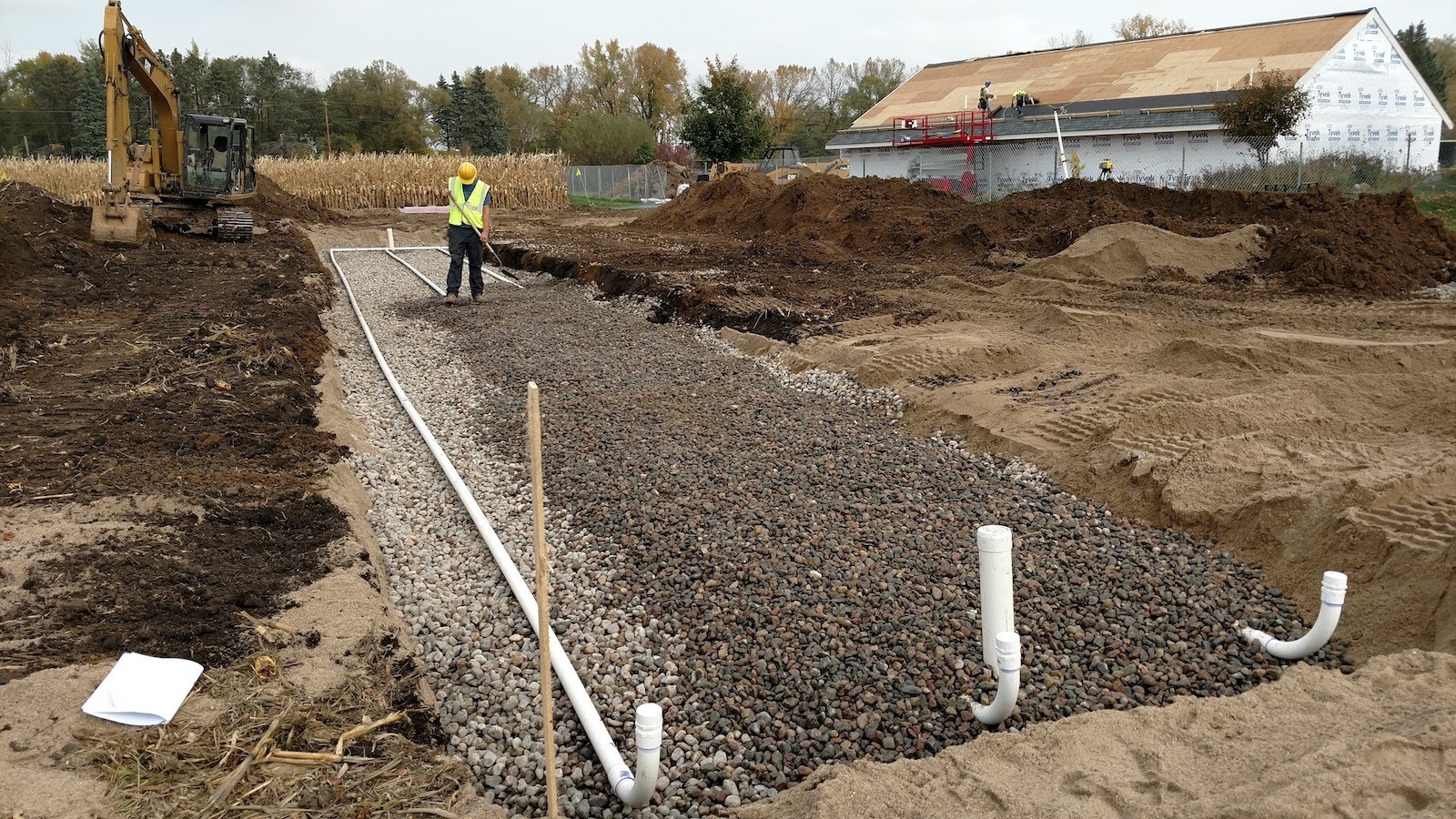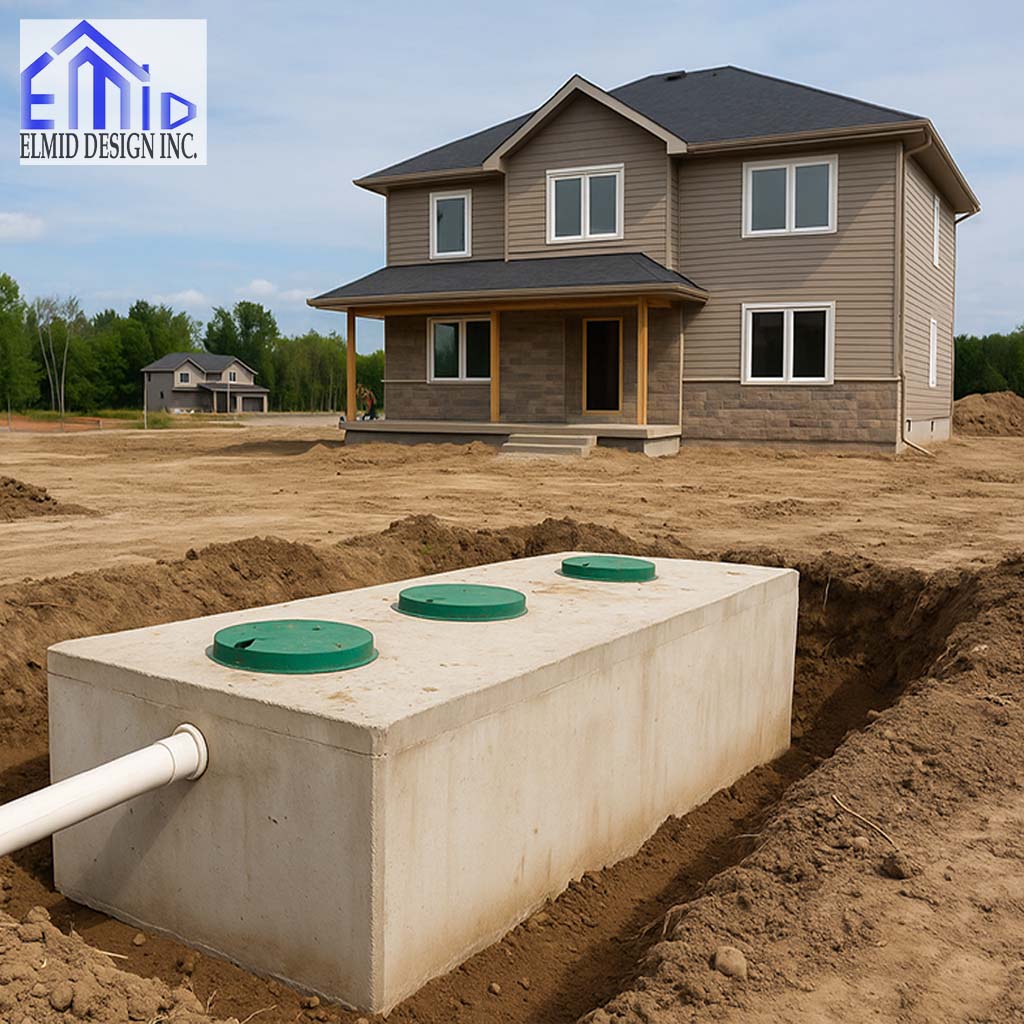When you need septic design Guelph services, your project must follow specific local and provincial regulations while ensuring that your design meets technical, environmental, and health standards. This detailed guide explains everything from site evaluations to system types, permits, and why working with licensed professionals like Elmid Design Inc ensures your system is safe, approved, and built to last. Whether you’re developing rural property or replacing an outdated system, this article provides expert guidance and local insight to move forward confidently.
Septic Design Guelph — Local Rules and Ontario Building Code
In Guelph, the Ontario Building Code regulates all septic systems under Part 8, which applies to properties without municipal sewer connections. Wellington-Dufferin-Guelph Public Health issues permits for most residential and rural installations. To meet approval, you must follow strict rules on system size, soil quality, daily flow rates, and property setbacks. Failing to follow these rules leads to delays, fines, or forced system removal. To move forward legally, submit your septic design Guelph with detailed site plans, soil test data, and design calculations before starting construction.
Soil Testing and Site Evaluation in Guelph
Before starting a septic system design, evaluate both the soil conditions and groundwater levels. A percolation test determines how quickly wastewater drains through your soil. In Guelph, qualified professionals perform this assessment using seasonal groundwater monitoring and test pits. If your site contains heavy clay or poor drainage, you may need an advanced or alternative system. Document all soil and slope data carefully, as these reports support your septic design Guelph and allow the health authority to review and approve the permit application without delay.
How System Type Affects Septic Design Guelph
The Ontario Building Code defines several system types, including conventional gravity systems, filter beds, raised systems, and tertiary treatment units. Your soil type, property size, and proximity to wells or water bodies influence the choice. In Guelph, many rural properties benefit from raised bed systems due to clay-rich soils. Where space is limited, compact tertiary systems may be approved with additional filtration requirements. Choosing the right system type ensures your septic design Guelph fits the site and protects groundwater resources.
Required Setbacks and Sizing in Guelph Septic Design
Minimum setback distances protect the environment and public health. In Guelph, septic systems must be located at least 15 metres from a drilled well and 30 metres from surface water. Drainage fields must be properly spaced from property lines, buildings, and water lines. System size is based on fixture count and daily design flow, typically ranging from 3,000 to 10,000 litres per day for residential systems. Proper sizing and placement ensure your septic design Guelph avoids contamination and operates efficiently.
Role of Engineering in Septic Design Guelph
For complex systems or larger flows, the Ontario Building Code requires septic designs be prepared by licensed professional engineers. Elmid Design Inc, authorized by Professional Engineers Ontario (PEO), delivers compliant and efficient designs for Guelph homeowners, builders, and developers. Engineering input ensures your system meets flow, loading rate, and environmental safety criteria. Using engineered drawings streamlines the permitting process and reduces inspection issues. Trusting certified professionals strengthens both technical reliability and regulatory approval in your septic design Guelph.
Common Reasons Septic Permits Are Delayed
Delays often occur when applications are missing required information. Incomplete soil testing, unclear drawings, or omitted flow calculations will stall your permit in Guelph. Incorrect assumptions about lot size, system type, or distances can also prompt revisions. Working with experienced designers or engineers minimizes these issues. A clear, well-prepared submission that meets Wellington-Dufferin-Guelph Public Health standards helps your septic design Guelph move smoothly through the review process and avoids costly resubmissions or on-site corrections.
Costs of Septic Design Guelph Projects
Costs vary depending on property conditions, system complexity, and the size of the home. A standard septic system in Guelph may range from $15,000 to $35,000, including design, permits, installation, and materials. Advanced systems can cost significantly more, especially where soil conditions or lot constraints demand specialized components. Design and engineering services also factor in, but investing in proper planning saves money long term. A professionally completed septic design Guelph helps avoid failure, maintenance issues, and environmental fines.
Signs Your Guelph Property Needs a New Septic System
Frequent backups, slow drainage, or foul odours near the septic field often indicate system failure. Soggy patches on the lawn or unusually green grass in drain field areas can also signal trouble. If your system is over 20 years old and hasn’t been upgraded or maintained regularly, it may no longer meet current code or perform safely. A detailed inspection and redesign is recommended. Modernizing your septic design Guelph improves environmental protection and long-term property value.
Winter Protection for Guelph Septic Systems
Ontario winters can cause septic system pipes or tanks to freeze if not properly insulated. Systems with minimal soil cover or shallow installations are most at risk. Before the cold season, ensure the system is pumped if needed and all fixtures are leak-free to avoid ice buildup. Maintain grass cover above the field and avoid driving or storing items on the system area. Winterizing your system helps prevent freeze damage and supports uninterrupted septic design Guelph performance year-round.
Inspections and Long-Term Maintenance Requirements
Once installed, septic systems in Guelph require ongoing maintenance to remain compliant. Regular tank pumping, typically every 3–5 years, prevents solids from clogging the drain field. Inspections should be scheduled if the property is sold, expanded, or shows signs of system stress. Keep maintenance records to support resale or code inquiries. An ignored system can fail quietly and result in major soil contamination. A proactive approach to maintenance preserves the investment in your septic design Guelph and protects your land.
Why Real Estate Buyers Care About Septic Design
Buyers in Guelph’s rural areas will ask about the septic system’s age, design, and condition. A system designed to current code and maintained with proper documentation adds value to the home. Outdated or unapproved systems can delay sales and lower offers. Sellers benefit from having their system inspected, pumped, and evaluated before listing. An updated, approved, and professionally managed septic design Guelph increases buyer confidence and supports faster, smoother property transactions in competitive rural markets.
Septic Design Guelph and Environmental Impact
Improperly designed or failing septic systems threaten local watersheds and wells. In the Guelph area, where agriculture and private wells are common, poorly filtered wastewater can contaminate nearby fields, streams, and groundwater. Local and provincial authorities enforce strict setback and treatment rules to limit these risks. By hiring experienced professionals and following site-specific testing protocols, your septic design Guelph can play a role in protecting the broader environment while serving your household effectively.

Understanding Permit Timelines for Septic Design Guelph
Permits for septic systems in Guelph typically take two to four weeks for approval, depending on the completeness of your application and the time of year. Delays are more common during peak construction seasons or when key documents are missing. Submitting soil test results, engineered site plans, and system specifications up front reduces processing time. Local health units may also conduct site inspections before approval. Planning early and preparing a full application file allows your septic design Guelph to proceed without costly delays that affect scheduling or financing.
Choosing a Qualified Septic Installer in Guelph
Licensed professionals build all legal septic systems in Ontario. In Guelph, installers must register with the Ministry of Municipal Affairs and Housing and carry a valid BCIN or equivalent. These professionals follow current codes and understand local site conditions. Choosing an unlicensed contractor creates serious risks to your permit and property. When you work with experienced professionals like those at Elmid Design Inc, you ensure your septic design Guelph meets all regulatory standards, passes inspections without delays, and functions reliably for years.
Why Elmid Design Inc Is Trusted in Guelph
Elmid Design Inc is a professional engineering firm authorized by Professional Engineers Ontario (PEO) to provide septic system design services throughout Ontario, including Guelph and Wellington County. Their team delivers engineered drawings, site planning, and permit-ready documentation that meets local health unit standards. With experience handling complex terrain and regulatory conditions, Elmid Design Inc ensures each septic design Guelph is safe, efficient, and code-compliant. Their strong reputation and technical knowledge help projects stay on schedule while protecting the environment and property values.
Planning for Long-Term Property Use
When designing a septic system, consider not only the current size of the home but also future expansions or usage changes. In Guelph, homeowners who later add bathrooms or finish basements may exceed their system’s design capacity. Redesigns and upgrades are costly and require new permits. Planning ahead allows you to size the system appropriately and avoid unnecessary construction later. A well-thought-out septic design Guelph should match both current needs and long-term goals, ensuring the system continues to meet code even as property use changes.
Septic Design and Water Table Management
High groundwater levels create major design challenges in Guelph, especially near shallow bedrock or wetlands. If your site includes a high water table, raise the septic field or install specialized filtering to maintain proper treatment. These approaches require additional engineering and often trigger more inspections. Failing to address water table issues increases the risk of surface discharge and groundwater contamination. A thorough site analysis allows your septic design Guelph to use techniques that prevent flooding and maintain consistent filtration, even during heavy rains or spring thaws.
Greywater vs. Blackwater System Planning
In rural Guelph developments, separating greywater and blackwater may improve system efficiency or simplify maintenance. Greywater includes wastewater from showers and sinks, while blackwater includes toilet discharge. Ontario allows for approved greywater recycling systems under certain conditions. If implemented correctly, these systems reduce strain on the primary tank and drain field. However, they must be approved by the local building authority. Considering a dual-system approach as part of your septic design Guelph may offer both environmental and financial benefits when planned correctly.
Common Installation Mistakes to Avoid
Improperly sloped pipes, undersized tanks, or drain fields placed in compacted soil often lead to premature failure. In Guelph, these errors are more frequent when unlicensed or inexperienced installers attempt shortcuts to save time. Overuse of heavy machinery during construction can also compact soil and reduce drainage effectiveness. Avoiding these mistakes begins with detailed site planning and professional design review. Your septic design Guelph should include specifications for pipe elevation, soil preparation, and inspection access that prevent common causes of malfunction or environmental violations.
Real Estate Inspections and Septic Disclosure in Guelph
When buying or selling a rural property in Guelph, the condition and design of the septic system become part of the due diligence process. Home inspectors often review the system’s age, design capacity, and maintenance history. Sellers must disclose system details if known, especially if the system is not up to current code. Buyers may request pumping or formal inspection before closing. A well-documented septic design Guelph can speed up real estate transactions and give buyers the assurance that the system meets both provincial regulations and modern performance standards.
How Septic Systems Affect Insurance in Guelph
Home insurance policies sometimes consider the age and status of your septic system when determining coverage eligibility or premiums. A failed system or one installed without permits can result in denied claims related to water damage or property repairs. In Guelph, insurers may require confirmation that your system meets current Ontario Building Code standards. Ensuring that your septic design Guelph is properly documented, permitted, and maintained protects your insurance coverage and strengthens your application for property improvements or refinancing.
Preventing Tree Root Infiltration in Septic Systems
Tree roots are a leading cause of septic system failure in rural Ontario. In Guelph, properties often feature mature landscaping or new plantings that can interfere with drain lines or tank seals. Tree roots seek moisture and nutrients, entering pipe joints and spreading throughout the system. This can cause blockages, backups, and costly repairs. Avoiding this issue requires careful planning during installation, including proper distance from trees and choosing low-impact vegetation. Your septic design Guelph should include vegetation management strategies to preserve system function without compromising landscape goals.
Septic Design for Cottages and Seasonal Properties
Seasonal properties in Guelph require different septic considerations than full-time homes. System design must account for intermittent use, long idle periods, and freeze-thaw cycles. Tanks may need additional ventilation or alarms, and drain fields must drain quickly to prevent winter pooling. A smaller system may be allowed if water usage is low, but the same regulations still apply. Proper design ensures your system remains safe and functional even when used only a few months each year. A seasonal septic design Guelph that meets provincial standards still protects water sources and prevents off-season damage.
Septic System Upgrades vs. Full Replacement
When your current system fails, you might not need a complete replacement. In many Guelph cases, a tank or drain field can be upgraded to meet new capacity or code standards. Upgrades may include adding a tertiary filter, replacing distribution piping, or expanding the leaching bed. Full replacements become necessary when the original design no longer meets soil or space requirements. A professional assessment helps determine the best solution. Upgrading your septic design Guelph can save money, extend system life, and improve compliance without total excavation.
FAQs About Septic Design Guelph
Who approves septic permits in Guelph?
Wellington-Dufferin-Guelph Public Health handles septic system permits. Applications require site evaluations and system plans for review and approval.
How long does it take to design and permit a system?
The full process typically takes two to four weeks if documents are complete. Delays may occur during peak seasons or with complex site conditions.
What is the average cost of septic design and installation in Guelph?
Most systems range from $15,000 to $35,000 based on property conditions and system complexity. Engineered designs may add to initial costs but ensure long-term performance.
Can I install my own system without a professional?
Only licensed installers registered with the province can legally install systems. DIY installation is not permitted and would not pass inspection.
How often should septic systems be pumped in Guelph?
Most systems require pumping every three to five years, depending on household size and tank volume. Regular inspections are also recommended.

Why Elmid Design Inc Is the Right Choice for Septic Design in Guelph
Elmid Design Inc is a licensed engineering firm with a Certificate of Authorization from Professional Engineers Ontario (PEO), offering trusted septic design services across Guelph and surrounding areas. The team delivers fully engineered septic solutions that meet Ontario Building Code standards and local health unit requirements. With deep expertise in site evaluations, regulatory compliance, and system efficiency, Elmid Design Inc helps property owners secure permits quickly and avoid costly design issues. Their reputation for precision and professionalism makes them a leading name in septic design Guelph.
Geographic Locations That We Service:
Our Licensed Professional Engineers specializing in Engineered Site Grading Plans offer the best-engineered site grading plan, lot grading and erosion plan, and drainage plan to obtain site plan approval and building permits in Ontario, including a wide range of municipalities. Each area boasts unique features and requirements, making our tailored approach essential for success.
Toronto and Surrounding Areas
In the vibrant heart of Ontario, we service Toronto (City of Toronto) and surrounding areas. Additionally, we cover Oshawa (City of Oshawa), Pickering (City of Pickering), and Clarington (Municipality of Clarington). Furthermore, our expertise extends to Ajax (Town of Ajax), Whitby (Town of Whitby), Brock (Township of Brock), Scugog (Township of Scugog), and Uxbridge (Township of Uxbridge).
Halton Region
Moving to the Halton Region, our services encompass Burlington (City of Burlington) and Halton Hills (Town of Halton Hills). Also included are Milton (Town of Milton) and Oakville (Town of Oakville).
Peel Region
In the Peel Region, we provide services in Brampton (City of Brampton), Mississauga (City of Mississauga), and Caledon (Town of Caledon).
York Region
Our services in the York Region cover Vaughan (City of Vaughan), Aurora (Town of Aurora), and East Gwillimbury (Town of East Gwillimbury). We also cater to Georgina (Town of Georgina), Markham (City of Markham), Newmarket (Town of Newmarket), Richmond Hill (City of Richmond Hill), Whitchurch-Stouffville (Town of Whitchurch-Stouffville), King (Township of King), and Bradford-West Gwillimbury (Town of Bradford-West Gwillimbury). Each municipality here offers a distinct setting, requiring our specialized approach.
Other Southern Ontario Cities and Towns
We also serve many other cities and towns in Southern Ontario. These include Hamilton (City of Hamilton), St. Catharines (City of St. Catharines), Niagara on the Lake (Town of Niagara on the Lake), Brant (County of Brant), Cambridge (City of Cambridge), Kitchener (City of Kitchener), Waterloo (City of Waterloo), and Woodstock (City of Woodstock). Furthermore, we operate in Guelph (City of Guelph), Centre Wellington (Township of Centre Wellington), Shelburne (Town of Shelburne), Orangeville (Town of Orangeville), New Tecumseth (Town of New Tecumseth), Essa (Town of Essa), Collingwood (Town of Collingwood), Wasaga Beach (Town of Wasaga Beach), Barrie (City of Barrie), Midland (Town of Midland), Orillia (City of Orillia), Ramara (Town of Ramara), Minden Hills (Town of Minden Hills), North Kawartha (Town of North Kawartha), Kawartha Lakes (City of Kawartha Lakes), Peterborough (City of Peterborough), Selwyn (Town of Selwyn), and Brighton (Municipality of Brighton).




